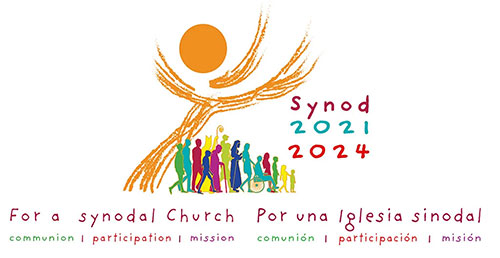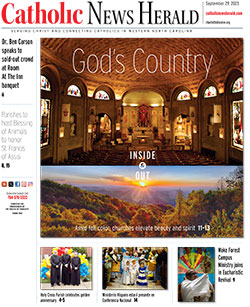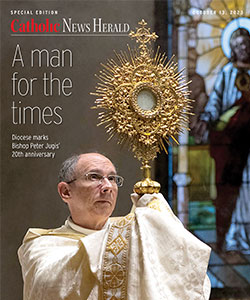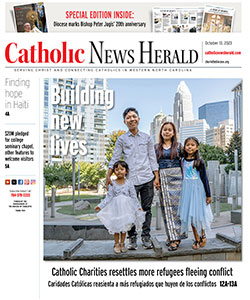 CHARLOTTE — Church leaders are continuing to discuss issues of concern for Catholics today in a second series of listening sessions in the ongoing Synod on Synodality – this time, related to Church organization and structure.
CHARLOTTE — Church leaders are continuing to discuss issues of concern for Catholics today in a second series of listening sessions in the ongoing Synod on Synodality – this time, related to Church organization and structure.
Launched by Pope Francis in October 2021, the Synod of Bishops – the theme of which is “communion, participation and mission” – has sought the perspectives of all baptized Catholics on fostering what the pope has described as a “listening Church.”
U.S. dioceses including Charlotte have been conducting more listening sessions as part of the Synod’s “interim stage” – described as a time of reflection and preparation for a second session of the global Synod on Synodality this October in Rome.
This stage of the Synod is building on – not repeating – the work of the Synod that already took place in 2022-23. Specifically, the U.S. Conference of Catholic Bishops asked dioceses to host a few more listening sessions and provide feedback to the Vatican on:
n Where have I seen or experienced successes – and distresses – within the Church’s structure(s)/organization/leadership/life that encourage or hinder the mission?
n How can the structures and organization of the Church help all the baptized to respond to the call to proclaim the Gospel and to live as a community of love and mercy in Christ?
Bishop Peter Jugis enthusiastically responded to the USCCB’s call, resuming the local Synod effort led in 2022-23 by Dr. Alessandro Rovati from Belmont Abbey College and a team of three others: Ibis Centeno (Hispanic ministry coordinator, Salisbury Vicariate), Mary Selby (synod coordinator, St. Eugene Parish, Asheville), and Shane Page (director of evangelization, St. Michael Parish, Gastonia).
Bishop Jugis noted, “The participation of the Diocese of Charlotte … is an important way to foster the bonds of communion with other U.S. dioceses, the USCCB, and the universal Church and continue the path of listening to the People of God … thus giving a sign of the love and care the Church has for each person.”
In March, the local Synod team held eight listening sessions with selected key leaders – including the Presbyteral Council (a group of priests that advises the bishop), other clergy and parish council representatives, deacons, Hispanic Ministry coordinators, the African American Affairs Ministry, and the diocesan offices of Catechetical Formation, Youth Ministry, and Campus and Young Adult Ministry.
The local Synod team received positive feedback about the direction the diocese is headed, said team member Shane Page.
“There is eagerness and excitement about the growth of the diocese – especially the growing numbers of Hispanic Catholics and young people, and opportunities for catechesis and learning,” Page said.
The growing use of digital technologies, thanks in part to the pandemic, has also made the online efforts of parishes and ministries easier and more effective, he said.
The listening sessions also identified the need to go “to the peripheries” given the size of the diocese: more than 530,000 Catholics in 92 parishes and missions, spread out over 20,700 square miles.
Participants also acknowledged a need for better integration between English-speaking and Spanish-speaking Catholics in parish life.
Participants also expressed the desire for more catechesis and training so people can better evangelize in their own spheres.
Page noted that some participants approached the listening sessions with some cynicism, but afterwards said they enjoyed the experience.
“They saw that they were not alone in their opinions,” he said. “It was very edifying for them.”
Rovati and the local Synod team prepared a summary of the listening sessions for Bishop Jugis and Bishop-elect Martin’s review and sent it to the USCCB.
The USCCB is now preparing a national document based upon the feedback received from the U.S. dioceses and will share it with the Vatican at the beginning of May. In turn, the Vatican will use it and reports from other countries’ bishops conferences to prepare for the October 2024 Synod of Bishops in Rome, where they will decide what concrete proposals to give the pope.
Part of their task is figuring out how decisions are made in the Church in a way faithful to its nature – including discerning how episcopal collegiality is exercised in a synodal Church, where every member shares responsibility for the mission of evangelization.
The worldwide Synod on Synodality is meant to help the Church engage with more people and evangelize in today’s world, Page emphasized, not rewrite Church doctrine. “It’s about how we apply doctrine for the sake of evangelization. Where is the Church doing well, and where is it getting in its own way?”
— Patricia L. Guilfoyle. OSV News contributed.
More online
At www.charlottediocese.org/faith-life/synod: Learn more about the Synod on Synodality and read the Diocese of Charlotte’s 2023 Synod Report that summarized input from more than 7,000 Catholics who took part in 400 listening sessions in 2021-22.


 CHARLOTTE — The Diocese of Charlotte’s official news outlet, the Catholic News Herald, has been named “Best Newspaper” among non-weeklies for the second consecutive year by the Catholic Media Association.
CHARLOTTE — The Diocese of Charlotte’s official news outlet, the Catholic News Herald, has been named “Best Newspaper” among non-weeklies for the second consecutive year by the Catholic Media Association.
The diocese’s website, www.charlottediocese.org, which was overhauled and relaunched last fall, also won “Best Website” among all (arch)diocesan members of the Catholic Media Association.
With members spanning the United States and Canada, the association’s top honors recognize Catholic print and digital publications that showed consistent excellence in 2023. Judges evaluated the quality and originality of content, writing and headlines, editorials, art and graphics, overall design, and usability.
Awards were announced June 21 during the Catholic Media Association’s annual conference in Atlanta.
“Communications is fundamental to our mission of spreading the Good News of the Gospel, and we are humbled by the support and collaboration we receive from our parishes, schools and ministries every day to help tell the stories of our diocese,” said Monsignor Patrick Winslow, vicar general and chancellor of the diocese. “It’s gratifying for our diocese to be recognized at a national level.”
The Catholic News Herald has previously been recognized as the nation’s best non-weekly diocesan newspaper for its work published in 2012, 2018, 2019 and 2022.
The diocese’s website, designed by Leo Fierro and Patricia Guilfoyle in collaboration with departments across the diocese, serves as a concierge to help people grow in their faith and quickly find what they’re looking for, Monsignor Winslow said. Since the site was relaunched in October 2023, it has averaged nearly 13,000 unique visitors per month who have viewed over 350,000 pages.
The Catholic News Herald also won:
- First place, Best Special Supplement or Special Issue with an Advertising Emphasis: “A Man for the Times: Tribute to Bishop Peter Jugis,” by Kevin Eagan, David Puckett and the Catholic News Herald staff
- First place, Best Story and Photo Package by an Individual: “Keep a Torch Burning,” by César Hurtado
- First place, Best News Multimedia Package: “OLA opens SmartLab, where ‘it’s all on you’: Problem-solving With Robots, Drones and 3D Printers,” by Troy Hull and Liz Chandler
- First place, Best Use of Graphics: “Explore Some of Our Churches Across Western North Carolina,” by David Puckett (online and print)
- Second place, Best Layout of Article or Column by a Diocesan Newspaper: “Happy Hallowtide!” by Spencer K.M. Brown and David Puckett
- Second place, Best In-Depth News/Special Reporting by a Diocesan Non-Weekly Newspaper: “Building New Lives: Catholic Charities Resettles More Refugees Fleeing Conflict,” by Christina Lee Knauss and Troy Hull
- Third place, Best Annual Report of Diocesan Finances: “I Am With You Always,” by David Puckett and the Diocese of Charlotte Finance Office, led by CFO Matt Ferrante
- Third place, Best Portrait Photograph: The cover of “Vocations: The Lord has Chosen You to Make a Difference,” by Troy Hull
— Catholic News Herald

